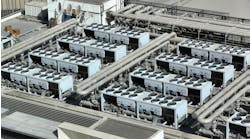If you’re a commercial building owner in San Francisco, you’re likely aware of the Early Care & Education Commercial Rents Tax Ordinance. Known as Proposition C and passed by voters on the June 5, 2018 ballot, the ordinance imposes a new gross receipts tax increase of 3.5 percent on all commercial leases in the city. Money generated from the tax will go toward city-funded childcare and education.
The ballot measure was approved by a narrow 50.87 percent, and landlords are expected to pass the new tax onto their tenants’ leases, according to the San Francisco Examiner.
Owners Sue the City
Not long after the ordinance was passed, a group of business and property owner organizations sued the city to invalidate the tax. The lawsuit says that the tax should have been considered a “special tax,” and therefore needed a two-thirds majority to pass under the state constitution.
In the meantime, San Francisco building owners will still have to pay the tax, which went into effect January 2019. City officials estimate it will bring in $146 million in revenue, according to Ballotpedia.
Those who support the tax argue that the previous gross receipts tax was “incredibly low” at 0.3 percent compared to other major US cities.
[More from this city: Leaning Tower of... San Francisco?]
Proposition C
Groups that support Prop C also argue that large American corporations have experienced record-breaking tax breaks under President Trump. Those who oppose the tax argue that the resulting rent hike might drive some commercial tenants away from San Francisco.
Preventive Maintenance Checklist
Download this checklist to keep major building systems – HVAC, roofing, plumbing and lighting – in good working order.
What This Means for Facilities Managers
If you’re a facilities manager in San Francisco, it’s likely your building owner’s CFO and accounting department are working on estimating incurred costs from the tax and how much tenants can expect their rent to rise.
Facilities departments are often unfairly perceived as a cost center that doesn’t generate profit, so your budget may be reduced to help offset the rent hike.
If you have concerns, request a detailed copy of the building owner’s calculations to see if your operating costs are affected. This is also a good time to demonstrate how your work aligns with your organization’s objectives with the goal of being perceived as an important part of the bottom line, not just an ongoing cost.
Help BUILDINGS Shape 2019!
What BUILDINGS resources are most valuable to you? What would you like to see us provide?
Please take our short (under 2 minutes) survey - just 5 short questions.
Thank you!
If you’re not a facilities manager in San Francisco, it’s still prudent to consider how your operations might be affected by a similar tax or rent increases. It’s possible that other cities may follow San Francisco’s lead and raise their own gross receipts taxes, which could impact your budget if any part of your portfolio is in a city that raises its gross receipts tax.
Two handpicked articles to read next:




